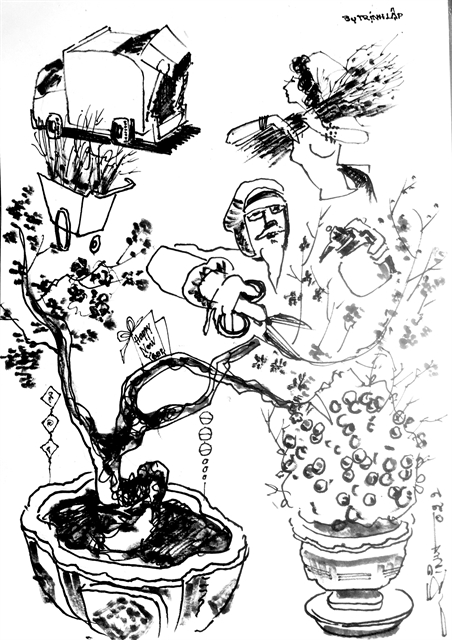
Illustration by Trịnh Lập
by Nguyễn Mỹ Hà
It is past the first full moon after Tết (Lunar New Year festival) and the amount of discarded peach blossom branches has become a problem for the city's sanitary workers. If each family in this city of 7 million people, or roughly 1.7 million households, each throw away at least one branch, then how much extra garbage is being dumped in the city's trash-collecting sites?
This has been common over the years, but we have not heard any complaints from the city's overworked and underpaid sanitary workers.
Even though they don't complain, there are people who want to relieve some of their hard work.
"Every Tết, there are two things I have to do with my own hands," wrote Hà Nguyễn in a community Facebook group that has more than 2 million members. "I have to buy a peach branch and when Tết is over, I chop it into small pieces, tie it up and put it nicely away in our family's garbage bags.”
"It's a lot of work for our sanitary workers if they have to collect all the peach branches. If every family can give a hand, it's a lot less for one worker to do the job for so many."
If you live in a condo, you may have to pay a fine if you just throw away a big branch. Today, people have bigger homes, and the villagers plant ever bigger trees with beautiful deep pink, double-layered peach blossoms. It's a must to have a peach blossom in a Hanoian home.
Hà wrote that she bought a saw to cut the branch, and kept some to dry them for her handicraft projects. All the flower petals were shrugged off and the branches pruned.
"Just think about your stress, and cut, cut, cut. It helps relieve a lot of your stress if you're angry at your better half," she joked.
The post on how to nicely cut down and discard a peach branch received many encouraging comments.
Some even suggested she dry out the branches when it's sunny, then burn them, and use the ashes to fertilise her balcony flower pots.
"It's illegal to burn something in your apartment," replied one netizen. "In apartment buildings, there's a community urn for votive money and paper to be burned and it's strictly used for that purpose only."
A popular saying goes, "Tiếng lành đồn xa" (good words spread far), and this post has been applauded by community members far and wide.
About 10 years ago, Hà Nội had a garbage sorting project. Each family was even given two garbage bins to keep organic and non-organic garbage with a leaflet explaining the difference.
The project was well-intended, but it died prematurely because people were too lazy and the trash collecting system was not ready and up-and-running to deal with two sources of garbage.
Now, as the drive toward clean living gets more popular among the city's office workers, and apartment-owners, partly due to the pandemic that turned people's lives upside down, the need to live greener and discard less garbage has become trendy.
The consensus on how to treat household trash has gone wider as housewives, office workers, and gardeners have started to use their kitchen garbage to make compost for their home-balcony trees and rose pots.
"We've been sorting out our kitchen garbage, and making compost with vegetables and leftovers, the rest of our garbage is now very small," said one fan of composting,
"My flowers bloom more, and I can give away bottles of magic liquid to make our neighbours' roses and climbing plants grow better."
When you talk about neighbours, you may think of the clichéd saying "Keeping up with the Joneses", or as the Vietnamese saying goes, "Bán anh em xa, mua láng giềng gần" (selling your siblings who live far away to buy neighbours who live close). Who says the Vietnamese are not pragmatic?
This could mean conflict or tension with your neighbours. But when they become envious of your beautiful flowers, you can give them a bottle of homemade compost that will do the same to help their ailing trees and potted plants. They are bound to be pleased.
"When you start making compost," said another city balcony gardener, "you realise how much food your household discards each week, and you can never use up all your compost because it can water the whole garden. Even if you can't use it all, strain it into the city's sewage system and it will help the common wastewater to dissolve its organic matter better."
"Waste not, want not", is the key here. If we all do our bit, life might just be a little easier for the city’s trash collectors. And we will get to live in a cleaner, greener city. And who could argue with that? VNS
OVietnam